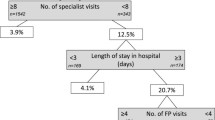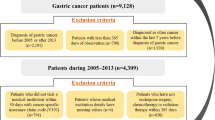Abstract
Purpose
Fragmented cancer care (FC) means that patients visit multiple providers for treatment, which is common in cancer care. While FC is associated with poor health outcomes in patients with colorectal cancer (CRC) worldwide, there is still a lack of evidence in South Korea. We investigated the association between FC and 5-year morality in patients with CRC using population-based claims data.
Methods
The study population was followed up from 2002 to 2015. Data were collected from Korea National Health Insurance claims. Participants comprised patients with CRC diagnosed with International Classification of Diseases (ICD)-10 (C18.x–C20.x) and a special claim code for cancer (V193). Data were analyzed using the Kaplan–Meier curve with a log-rank test and Cox proportional hazard model. The effect of FC on patients’ 5-year survival was examined.
Results
Of 3467 patients with CRC, 20.0% had experienced FC. FC was significantly associated with an increased risk of 5-year mortality (hazard ratio 1.516, 95% confidence interval 1.274–1.804). FC was prevalent in those who had a low income level, underwent chemotherapy, did not undergo radiation therapy, and did not visit a tertiary hospital for their first treatment.
Conclusion
Efforts to decrease FC and integrate complex cancer care within appropriate healthcare delivery systems may improve survivorship among patients with CRC.



Similar content being viewed by others
Data availability
Data for this study are public data and can be obtained from the following NHIS website after completing the application form and fee payment: https://nhiss.nhis.or.kr/bd/ab/bdaba000eng.do.
References
Abelson JS, Bauer PS, Barron J, Bommireddy A, Chapman WC Jr, Schad C, Ohman K, Hunt S, Mutch M, Silviera M (2021) Fragmented care in the treatment of rectal cancer and time to definitive therapy. J Am Coll Surg 232:27–33
Aquina CT, Probst CP, Becerra AZ, Iannuzzi JC, Kelly KN, Hensley BJ, Rickles AS, Noyes K, Fleming FJ, Monson JR (2016) High volume improves outcomes: the argument for centralization of rectal cancer surgery. Surgery 159:736–748
Baker A (2001) Crossing the quality chasm: a new health system for the 21st century. British Medical Journal Publishing Group.
Begg CB, Cramer LD, Hoskins WJ, Brennan MF (1998) Impact of hospital volume on operative mortality for major cancer surgery. JAMA 280:1747–1751
Biju K, Zhang GQ, Stem M, Sahyoun R, Safar B, Atallah C, Efron JE, Rajput A (2021) Impact of treatment coordination on overall survival in rectal cancer. Clin Colorectal Cancer 20:187–196
Casey MM, Call KT, Klingner JM (2001) Are rural residents less likely to obtain recommended preventive healthcare services? Am J Prevent Med 21:182–188
Chen MM, Megwalu UC, Liew J, Sirjani D, Rosenthal EL, Divi V (2019) Regionalization of head and neck cancer surgery may fragment care and impact overall survival. Laryngoscope 129:1413–1419
Clarke CA, Glaser SL, Leung R, Davidson-Allen K, Gomez SL, Keegan TH (2017) Prevalence and characteristics of cancer patients receiving care from single vs. multiple institutions. Cancer Epidemiol 46:27–33
Crosson FJ (2009) 21st-century health care—the case for integrated delivery systems. N Eng J Med 361:1324–1325
Desch CE, McNiff KK, Schneider EC, Schrag D, McClure J, Lepisto E, Donaldson MS, Kahn KL, Weeks JC, Ko CY, Stewart AK (2008) American society of clinical oncology/national comprehensive cancer network quality measures. J Clin Oncol 26:3631–3637
Freischlag K, Olivere L, Turner M, Adam M, Mantyh C, Migaly J (2021) Does fragmentation of care in locally advanced rectal cancer increase patient mortality? J Gastrointest Surg 25:1287–1296
Hempstead K, DeLia D, Cantor JC, Nguyen T, Brenner J (2014) The fragmentation of hospital use among a cohort of high utilizers: implications for emerging care coordination strategies for patients with multiple chronic conditions. Med Care 1:S67–S74
Hester CA, Karbhari N, Rich NE, Augustine M, Mansour JC, Polanco PM, Porembka MR, Wang SC, Zeh HJ III, Singal AG, Yopp AC (2019) Effect of fragmentation of cancer care on treatment use and survival in hepatocellular carcinoma. Cancer 125:3428–3436
Hong S, Won YJ, Park YR, Jung KW, Kong HJ, Lee ES (2021) Cancer statistics in Korea: incidence, mortality, survival, and prevalence in 2018. Cancer Res Treat 52:335
Hosseinali Khani M, Smedh K (2010) Centralization of rectal cancer surgery improves long-term survival. Colorectal Dis 12:874–879
Hussain T, Chang HY, Veenstra CM, Pollack CE (2015) Fragmentation in specialist care and stage III colon cancer. Cancer 121:3316–3324
Kronebusch K (2009) Assessing changes in high-volume hospital use: hospitals, payers, and aggregate volume trends. Med Care Res Rev 66:197–218
Kurian AW, Mitani A, Desai M, Yu PP, Seto T, Weber SC, Olson C, Kenkare P, Gomez SL, de Bruin MA, Horst K (2014) Breast cancer treatment across health care systems: linking electronic medical records and state registry data to enable outcomes research. Cancer 120:103–111
Ludt S, Urban E, Eckardt J, Wache S, Broge B, Kaufmann-Kolle P, Heller G, Miksch A, Glassen K, Hermann K, Bölter R (2013) Evaluating the quality of colorectal cancer care across the interface of healthcare sectors. PLoS One 8:e60947
Lutfi W, Zenati MS, Zureikat AH, Zeh HJ, Hogg ME (2018) Health disparities impact expected treatment of pancreatic ductal adenocarcinoma nationally. Ann Surg Oncol 25:1860–1867
Morris M, Platell C, Fritschi L, Iacopetta B (2007) Failure to complete adjuvant chemotherapy is associated with adverse survival in stage III colon cancer patients. Br J Cancer 96:701–707
Nacion AJ, Park YY, Yang SY, Kim NK (2018) Critical and challenging issues in the surgical management of low-lying rectal cancer. Yonsei Med J 59:703–716
Onega T, Duell EJ, Shi X, Wang D, Demidenko E, Goodman D (2008) Geographic access to cancer care in the US. Cancer 112:909–918
Plsek P (2001) Crossing the quality chasm: a new health system for the 21st century. National Academies Press, Washington, DC
Rogers SO Jr, Ayanian JZ, Ko CY, Kahn KL, Zaslavsky AM, Sandler RS, Keating NL (2009) Surgeons’ volume of colorectal cancer procedures and collaborative decision-making about adjuvant therapies. Ann Surg 250:895
Rosell L, Alexandersson N, Hagberg O, Nilbert M (2018) Benefits, barriers and opinions on multidisciplinary team meetings: a survey in Swedish cancer care. BMC Health Serv Res 18:1–10
Schrag D, Panageas KS, Riedel E, Hsieh L, Bach PB, Guillem JG, Begg CB (2003) Surgeon volume compared to hospital volume as a predictor of outcome following primary colon cancer resection. J Surg Oncol 83:68–78
Sridhar P, Misir P, Kwak H, deGeus SW, Drake FT, Cassidy MR, McAneny DA, Tseng JF, Sachs TE (2019) Impact of race, insurance status, and primary language on presentation, treatment, and outcomes of patients with pancreatic adenocarcinoma at a safety-net hospital. J Am Coll Surg 229:389–396
Stitzenberg KB, Meropol NJ (2010) Trends in centralization of cancer surgery. Ann Surg Oncol 17:2824–2831
Sung H, Ferlay J, Siegel RL, Laversanne M, Soerjomataram I, Jemal A, Bray F (2021) Global cancer statistics 2020: GLOBOCAN estimates of incidence and mortality worldwide for 36 cancers in 185 countries. CA Cancer J Clin 71:209–249
Uphoff EP, Wennekes L, Punt CJ, Grol RP, Wollersheim HC, Hermens RP, Ottevanger PB (2012) Development of generic quality indicators for patient-centered cancer care by using a RAND modified Delphi method. Cancer Nurs 35:29–37
Funding
This work was supported by the National Cancer Center (no. NCC 2111070-2). The funding sources did not play a role in study design or data interpretation.
Author information
Authors and Affiliations
Contributions
DWC and KTH led the design and conception of the study and wrote the manuscript. DWK performed the data analysis. SJK contributed to the discussion and reviewed and edited the manuscript. All the authors have read and approved the final manuscript.
Corresponding author
Ethics declarations
Competing interests
The authors have no relevant financial or non-financial interests to disclose.
Ethics approval
This study utilized secondary data, and all patients’ personal data were encrypted and anonymized. A waiver from the Institutional Review Board of the International Review Board, Korean National Cancer Center (no. NCC2021-0060) was obtained. All methods were performed in accordance with relevant guidelines and regulations.
Consent to participate
A waiver for informed consent was also approved by the International Review Board of the Korean National Cancer Center.
Consent to publish
Not applicable.
Additional information
Publisher's Note
Springer Nature remains neutral with regard to jurisdictional claims in published maps and institutional affiliations.
Rights and permissions
About this article
Cite this article
Choi, DW., Kim, S., Kim, D.W. et al. Fragmentation of care and colorectal cancer survival in South Korea: comparisons according to treatment at multiple hospitals. J Cancer Res Clin Oncol 148, 2323–2333 (2022). https://doi.org/10.1007/s00432-022-04035-9
Received:
Accepted:
Published:
Issue Date:
DOI: https://doi.org/10.1007/s00432-022-04035-9




